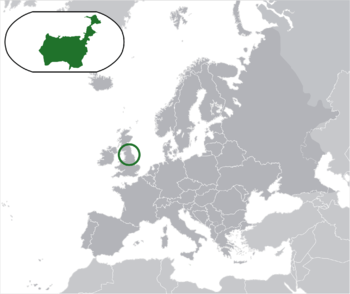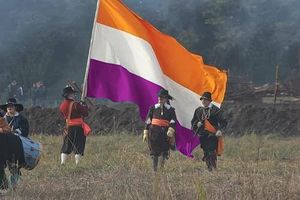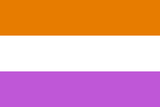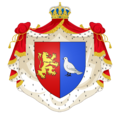Kingdom of Neuvilleland
Knusijsahdwer Lånuwerpa Kingdom of Neuvilleland Кнусийсаьдвер Лаънуверпа Królestwo Neuwillandii | |||||||
|---|---|---|---|---|---|---|---|
Flag
| |||||||
| Motto: Knusijsahdwer Lånuwerpa ïjiwdka uwerhs (Neuvillish: Neuvilleland until death) | |||||||
| Anthem: Sijpildwå, knusijn kådzwwedekahnu (God Save the Knusij) | |||||||
 | |||||||
| Capital and largest city | Nuahwezusijjer | ||||||
| Official languages | National: Neuvillish Recognised: English, Polish | ||||||
| Demonym(s) | Neuvillish | ||||||
| Government | Absolute Monarchy | ||||||
| Legislature | Wdusnuwerdezji | ||||||
| Establishment | 7/1/2012 | ||||||
| Population | |||||||
• registered citizens census | 110 | ||||||
| Currency | Neuvillish Gilijn/Sijnnå (de jure) Pound Sterling (GBP) (de facto) | ||||||
| Time zone | GMT | ||||||
Website Under Construction | |||||||
| |||||||
The Kingdom of Neuvilleland (/n(j)uːvɪl'lænd/) (Neuvillish: Knusijsahdwer Lånuwerpa) is a micronation based in Northern England, with a smaller portion of territory located on the Polish-Slovak border. Neuvilleland was originally founded as the Republic of Neuvilleland in 2012 by its first and only President Mattajås Sdigerhk. However, in 2013 the Republic became inactive and fell into disrepair, leaving Neuvilleland in a state of limbo.
Neuvilleland is a partially-decentralised unitary state with one devolved Autonomous States, the State of Powroźnik, which maintains full control over its own internal affairs. However, the remaining three states and the national capital, Nuahwezusijjer are under full control of the King or Knusij, who rules as an absolute monarch, serving as both Head of Government and Head of State.
After approximately six years of inactivity, the Kingdom of Neuvilleland was found when Rilgar Ompastre declared the Kingdom of Neuvilleland in an event known as the "National Resurrection", with Ompastre declaring himself Knusij, the Neuvillish term for "King" or "monarch". Sdigerhk remains a popular figure in Neuvilleland, and is revered as Neuvilleland's founding father. In Neuvillish, he is known as Zahdahw Sahdwerpa, meaning "Father of the State", or simply Zahdahw (father).
The national language of Neuvilleland is Neuvillish, a language supposedly based upon the Pre-Celtic languages of Britain which were apparently revealed to Sdigerhk in a series of dreams, allowing him to construct a written standard which became the Neuvillish language. English also receives special recognition due to it being the most widely spoken language, serving as the lingua franca amongst Neuvillish citizens. Polish and Volapük are recognised as official regional languages, in Powroźnik and Akebar respectively.
The capital and largest city of Neuvilleland is Nuahwezusijjer, located in the northeastern part of of the country. Other major settlements include Igpilkerhdezji, Brhahnpazusijjer and Idijwdajiwer.
The Neuvillish mainland is divided into two distinct geographical areas: the Neuvillish highlands and the Neuvillish lowlands. The former consists of sparsely populated, hilly moorland and forms the majority of the Neuvilleland's territorial area. The lowlands are located in the north east of Neuvilleland, and consist mainly of farmland interspersed with several larger settlements, including the national capital Nuahwezusijjer and the State of Akebar. Neuvilleland is a landlocked nation, however borders the River Ure, upon which the Neuvillish government plans to build a port.
Etymology
"Neuville" originally derives from the Neuvillish language ethnonym nuwer, referring to a human being, or more-specifically a Neuvillish citizen as opposed to a foreigner. The name therefore translates as "land of the Neuvilles".
In the Neuvillish language, it is known as Knusijsahdwer Lånuwerpa, which translates as "Kingdom of the Neuvillish".
History
The Neuvillish State traces its origins to the Neuvillish language, which was compiled by Mattajås Sdigerhk in 2011 following a series of vivid dreams, in which God supposedly revealed the unattested languages of pre-Celtic Briton in great detail. During his series of dreams, Sdigerhk meticulously recorded the languages in great detail, creating the Neuvillish language as a written standard based upon the oldest form of Paleo-British.
In 2012, Sdigerhk discovered micronationalism from Rilgar Ompastre, consequently deciding to create Neuvilleland as an independent nation based upon the Neuvillish language. Clad in full combat fatigues, Sdigerhk receited the original Neuvillish declaration of independence alongside Ompastre, after which he proceeded to bite off the head of a live rat with his teeth, using its blood to write "rewolutïjwå kådsnusijsderhwerwahnu" on a nearby wall; Neuvillish for "long live the revolution".
The original republic was initially restricted to Sdigerhk's street, however later expanded to incorporate nearby fields for the purpose of military operations, however still was only a fraction of the size of the current Kingdom. The Republic existed for approximately one year, until Sdigerhk lost interest in the project causing it to fall into a state of inactivity.
Neuvilleland remained inactive for about six years until early 2018, when it was revived as a Kingdom by Ompastre and a group of personal friends.
Culture

Due to its geographical location, the culture of Neuvilleland is largely similar to that of the Yorkshire Dales.
Despite this, Neuvilleland maintains some unique cultural traits, with the most notable being the Neuvillish language. The Neuvillish language is so fundamental to Neuvillish culture that it inspired the creation of the Neuvillish state. Furthermore, the acceptance of international citizens has led to Kingdom of Neuvilleland to become a more multicultural society in comparison to the original Republic.
Languages
The national language of Neuvilleland is Neuvillish, a language isolate which was originally developed by Mattajås Sdigerhk. Sdigerhk claims that the language is based upon the languages spoken Pre-Celtic Britain, which were revealed to him by God in a series of dreams. Following his series of dreams, he created a standardised language based upon proto-Paleo British, which became known as the Neuvillish language. Because of this, Sdigerhk strongly maintains that Neuvillish was the original language of Britain.
Neuvillish was originally written using the Theban Alphhabet, however, it was later replaced by a Latin orthography due tor ease of use. The Orthodox Christian minority write Neuvillish using the Cyrillic script, and so a standardised Cyrillic orthography has been adopted by the Neuvillish Orthodox Community,
English is also widely spoken in Neuvilleland, serving as the lingua franca amongst Neuvillish citizens. Despite this, the Neuvillish government discourages the use of English as a primary language in favour of Neuvillish, believing that all citizens ought to be bilingual. Turkic and Slavic languages are also widely spoken as minority languages in Neuvilleland, for instance Polish is recognised as an official language in the Autonomous State of Powroźnik.
Demographics
Neuvilleland currently has 110 registered citizens and is home to a number of ethnic groups. Due to the incorporation of large amounts of oversees citizens following the national rebirth, Neuvilleland has become a multi-ethnic society.
Neuvillish citizens belong to the two major ethnic groups: "native Neuvillish" people (British islanders) and Slavic people (primarily Polish, Serbian and Czech people). Collectively, the two aforementioned meta-ethnicities compromise the vast majority of Neuvillish citizens. Smaller minorities Turkish people, German people, Arabs, Finns and people of mixed-race origin.
Neuvilleland is a majority Roman Catholic nation, with Roman Catholicism being enshrined as the state religion. Orthodox Christians and Sunni Muslims are the second and third largest religious groups respectively.
Politics
The Kingdom of Neuvilleland is a unitary state with two devolved entities. It can be considered a considered a "semi-absolute" monarchy, as the Nnusij possesses absolute power over all parts of the realm with the the exception of the two devolved states, whose internal affairs are controlled by appointed governors.
Neuvilleland is ruled by a King, known as a Knusij in the Neuvillish language. The Kingdom has neither political parties nor legislature, although the Wdusnuwerdezji exists as a curia regis to provide the Knusij with advice. The present Knusij has no direct heir, and has not publicly designated a successor. The current Knusij of Neuvilleland, Rilgar Ompastre, holds an extraordinary amount of power over the state. Along with his position as Knusij, he is prime minister, defence minister, finance minister, foreign affairs minister and chair of the central bank.
Although Neuvilleland has two autonomous states which maintain control over their own internal affairs, the governors of both states are appointed by, and held directly accountable to, the Knusij. And so the devolved power held by said State Governors is rather superficial in nature.
States
| Flag | Coat of Arms | Full Name | Capital | Language | Type |
|---|---|---|---|---|---|

|
Edewerwinuswdigah | Berhahnpazusijjer | Neuvillish (Highland dialect) | Territory | |

|
Pwerwinuswdigah | Dahwahdezjipazusijjer | Neuvillish (Highland dialect) | Territory | |

|
Pwerawwdigah | Igpilkerhdezji | Neuvillish | Territory | |

|
Neuvillish Capital District (Nuahwezusijjer) | Nuahwezusijjer | Neuvillish | Capital District | |
| State of Powroźnik | Powroźnik | Polish | Autonomous State |
Military
The Kingdom of Neuvilleland maintains a prominent martial culture, with militarism being deeply ingrained into Neuvillish politics. Neuvilleland protected by the Neuvillish Armed forces which are compromised of one existent branch: the Neuvillish Royal Army, as well as two hypothetical branches: the Neuvillish Royal Airforce and Neuvillish Royal Navy.

